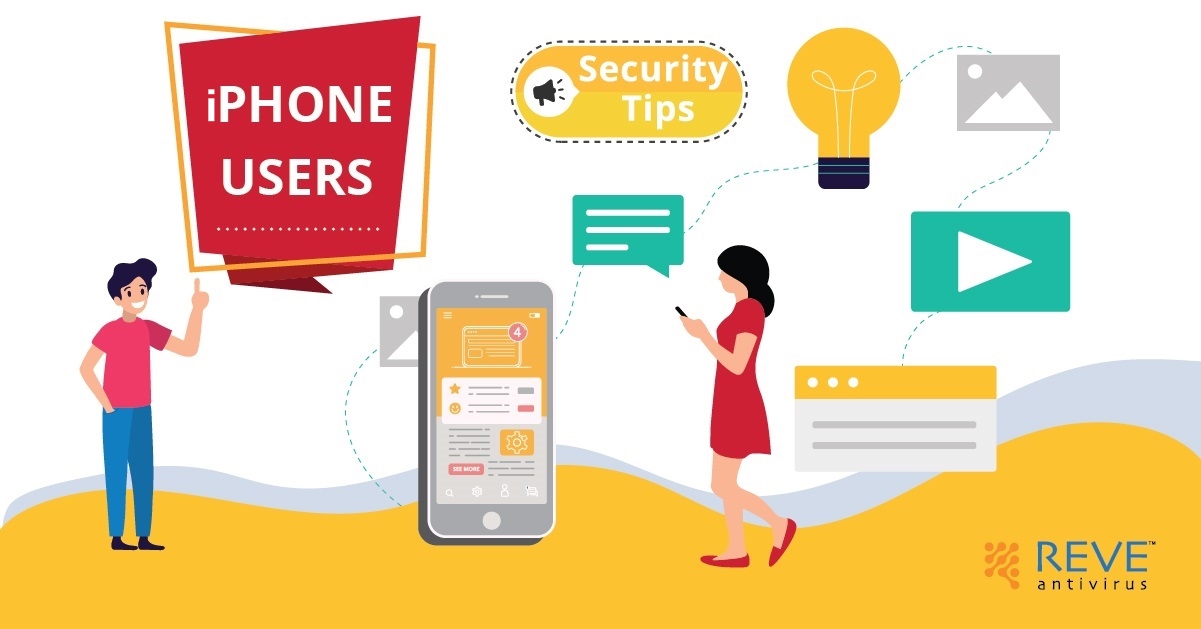
A lot of people own Apple devices, some out of pure love for the brand and some for security concerns. Apple is very particular about its user’s security and its iOS system doesn’t allow any unauthorized app to get into the user’s phone. But hackers are never in the mood to give up and try to gain access to the iOS system by finding even the smallest vulnerabilities.
If you want optimum security of data stored in your smartphone and sensitive information such as website logins, email addresses, text messages and even photos and videos, you have come to the right place. We have a few tips and tricks via which you can keep the iOS system secure and away from the prying eyes of hackers.
-
Don’t Forget To Update iOS
This first tip is definitely a no brainer but it deserve number one position in our list because updating the software is what a lot of people ignore doing. Some does it out of forgetfulness or sheer ignorance of the fact that outdated software helps hackers to gain access of the device. It is vital that every iPhone user must run the most recent iteration of iOS. While you are at it don’t forget to update even the smaller ‘dot’ updates.
A lot of people are aware of the fact that iOS software is hard to hack into and that’s the reason why hackers are constantly looking for flaws in Apple’s coding. If they find one, there’s no stopping them from exploiting its weakness. So, if you are not updating the software, you are potentially giving them access to your personal data. Apple sends you new iOS updates to combat the exploits by patching up any holes that might let the hackers sneak into the device.
In Case, You Haven’t Already Updated The Software, Follow The Below Stated Steps:
- Open the Settings in the app
- Tap General > Software update
You will see a note that will tell you if you are already using the latest version and if not, it will prompt you download and install the latest update. The latest version of iOS is iOS 12. Apple also regularly sends point updates so it is important to keep an eye out for those too.
-
Keep ‘Find My iPhone’ Activated
Trust us, hackers are pretty stubborn. They are not going to give up so easily, so it is our job to stay one step ahead of them. Do that by activating ‘Find my iPhone’. This way if you ever lose your iPhone, you can simply log on to ‘Find my iPhone’ from another iOS device and remotely wipe your device. Take all your personal data away before anyone could use it. If a hacker manages to get into your lost/stolen device, he won’t find anything there.
Wondering How To Wipe The Phone? Follow These Steps:
- Log in to the ‘Find my iPhone’ app (or iCloud website)
- Select your iPhone
- Tap ‘Erase iPhone’
- Confirm the action
The next time your lost/stolen phone will get connected to an internet connection, it will automatically wipe itself. What a relief, right?
-
Safety Lies In Longer Pass code
Probably, you would have heard this thing a thousand times: keep pass code long and complicated but easy enough for you to remember so that a hacker cannot decipher it. That is definitely the smartest thing to do but there how many of us really follow this advice? If you do, then you are a smart person. But, there a new hacking tool called Gray Key that is known for cracking iPhone and iPad passwords. Amazing thing is that this particular tool is also being used by law enforcement agencies.
Rumors are that it can crack a four-digit pass code in a few hours and a six-digit pass code in a few days. Getting jitters already?
The tool is plugged into an iOS device that disables the usual pass code retry and re-entry delay strategies that would stop anyone from accessing the phone after a few incorrect pass code entries. Obviously, you won’t be having any reasons to stop government officials to gain access of your device but the real concern is that if such a thing is possible via GrayKey tool, it highly likely that hackers might be using similar device to get into our phone without we having any knowledge of it.
Until Apple Finds A Way To Fix This Particular Vulnerability, Here Are Two Things That You Should Do ASAP:
- Opt for a long passcode, one that is longer than six-digit passcode. The longer the password, more difficult it would be to crack.
- Use a passphrase that is a combination of letters, numbers and symbols. Use random words that don’t really make sense for the hacker but you can easily remember.
Here’s How You Can Set Up New Pass Code For iOS
- Open Settings.
- Tap Touch ID & Pass code (or Face ID & Pass code if you have an iPhone X).
- Enter your Pass code.
- Cap on Change Pass code.
- Enter your Pass code.
- Tap Pass code Options.
- From the options, choose either Custom Numeric Code or Custom Alphanumeric Code.
- Now enter your new code and verify it.
Oh, you use Touch ID or Face ID to unlock your phone? Well, you will still need a passcode to unlock your phone if you haven’t used your phone for more than six days or when you restart your device. It’s better to be safe than sorry.
-
Carefully Use Auto-Wipe Option
iPhone users already know what auto-wipe option do in their smartphone but in case, you are one of those who is not yet aware of this feature, let us shed some light on it. The auto-wipe feature on the iPhone automatically wipes all content after ten incorrect passcode guesses, thus making the phone useless for the hacker. This option is great to maintain your safety but it is slightly worrying as many times people put in the wrong passcode a number of time (usually when under the influence of alcohol!) or kids keep playing with the smartphone and delete all personal information.
Though, there’s nothing to worry about when you use the automatic iCloud backup. By enabling the iCloud, you can use the auto-wipe option. So if you accidentally erase your phone or while someone is trying to hack you, your personal data will be erased from the phone but it will be perfectly safe in the cloud.
To Enable This Nuclear Option, Follow The Steps Below:
- Settings >
- Touch ID & Passcode
- Scroll to the bottom of the page
- Enable ‘Erase Data’
- Don’t Click On Unknown Links
Remember ‘stranger danger’? Same advice must be kept in mind while using iPhones. If you receive a link via SMS, email or randomly on the web from an unknown source, never ever click on it. Wondering why not to do so? This could be a potential threat to your device. Even if the hackers are not able to gain access to your iPhone through this scheme, it is enough for them to gain control of your email account.
Still, there are many people who click on unknown links and say that looks pretty close to the real thing. It will as this type of scam is very common and have evolved over the years, trying to reach perfection. So, it always pays to keep your wits about you.
While checking your emails, text messages or surfing the web, the only rule that you must follow is if anything looks suspicious, don’t bother opening it. Staying one step ahead of hackers is always fun and better not to give them any way to gain access to your Apple devices.
-
Revoke App Permissions
Another power that you have in your hand against the war with hackers is: revoking access to apps. While using iOS apps, your phone must have prompted you a number of times to allow the app to access other things on your phone like camera, photos, contacts, microphone etc. to use the apps to the fullest extent.
Without second thoughts, we allow access to the apps but here’s the catch, it might be accessing your private information. The best part is that it is against Apple’s privacy policy for an app to collect personally identifiable information. If found guilty of the crime Apple store removes the app. So far such a thing hasn’t happened but it doesn’t mean that it can’t in the future.
If you ever get the feeling that you have downloaded a less than reputable app, either delete it or head to your phone Settings> Privacy, select the permission that you would like to revoke.
-
It’s Time To Say Goodbye To Siri
The most fascinating feature in the iPhone is Siri. It is undoubtedly a great element of iOS and offers the users a hand-free experience. No matter how useful it might be to the users, Siri can also provide hackers with your personal data. Siri often asks for some kind of verification before allowing access to the contact list, photos and other types of sensitive information. There have been a number of incidents where people have found a way to bypass the iPhone pass code and access the device. If you don’t want your iPhone to be accessed without your permission, disable access to Siri on the lock screen.
To Disable Access To Siri On The Lock Screen:
- Settings >
- Touch ID and Passcode
- Toggle the “allow access when locked” option off.
- Turn Off Auto-Fill
Ah! The auto-fill feature. I’m sure every iPhone user could catch the vibe we are feeling at this moment. This particular feature is just amazing. Simply enable it and your smartphone will remember all your login details for a number of website, accounts along with your debit/credit card information. One single tap and Apple will be filling out all the information on your behalf, except for your security code.
The only drawback of this feature is that if a hacker gets a hold of your phone, he can easily gain access to all your online logins. So, why don’t we go back to the old school way of typing in all the details manually? This definitely takes time but it is worth the effort when personal information is at risk.
To Disable Key Chain And Auto-Fill, Follow These Steps:
- Settings >
- Safari >
- Auto Fill and
- Toggle off each option.
Conclusion
Your personal data is definitely safe under the watchful eyes of Apple’s security measures. But if you are doing the above-mentioned things, then you should probably head over to your phone’s settings and undo the changes to be double secured.
- RaaS : The Dark Side of SaaS
- Hackers Target MOVEit Transfer’s Zero-Day Vulnerability, Emergency Patch Deployed
- How Scammers Are Utilizing ChatGPT? Few Tips To Be Safe
- World Backup Day: Why Data Backups are Important in Cybersecurity
- What is Social Engineering and How Cyber Criminals Use It
- Things To Know About Personally Identifiable Information (PII)
- What is Data Breach? Why and How It occurs? How To Prevent Data Breach


